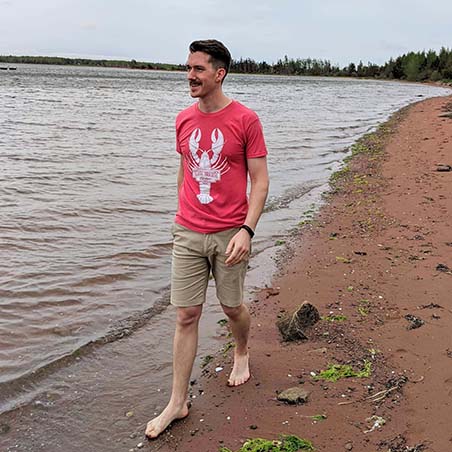Shawn Martin
Policy Coordinator/Analyst, Health PEI
Bachelor of Arts, (Hons), Social Anthropology, 2013
It’s all about the questions that lead you to understanding the process of thinking—critical thinking.
Shawn Martin was thinking about what he might say to new or prospective King’s students. He had two thoughts.
“It doesn’t matter who you are or where you’re from,” Shawn says, ”if you’re thinking about King’s, you belong at King’s.”
His second thought was this: “Take care of yourself. Get enough sleep. When it comes to sex, drugs and rock ‘n roll, practice harm reduction.”
Fitting advice from someone trained as an addictions and mental health counsellor.
After the Foundation Year Program (FYP) Shawn studied social anthropology. From there he had a decision to make. “I was waffling between social work and law. I wrote the LSAT and it went well enough that law was on the table. But I knew with social work that I could immediately do front line work.”
That was important to Shawn. Growing up, his parents had taught him a valuable lesson. “Service to others is a good way to live. It’s a good life. That’s what I learned from them.”
Shawn got his Bachelor of Social Work, then his Masters. His studies and a practicum took him to the front line of counselling and therapy. The neat thing was how well FYP had prepared him for it.
“When you learn counselling skills it’s called Socratic questioning for a reason. The purpose of it is to guide people to solutions that will be the best for them. The point is that people are able to come to their own questions and their own answers.”
Just like FYP.
Shawn says with a laugh, “You go into FYP and you are asking for answers and all you get in response are questions! There is a funny parallel there. It all goes back to the process of in-depth learning. It is not about having information fed to you. It’s all about the questions that lead you to understanding the process of thinking–critical thinking.”
Critical thinking is helping in the second phase of Shawn’s career. He’s a policy analyst now with Health PEI, Prince Edward Island’s Health Authority. It’s a perfect fit.
“I didn’t so much want to leave counselling, but I wanted to work on issues at a more macro level.”
With his experience on the front line, he knows what counsellors and therapists and others in social work need to do their jobs effectively, and what policies are required. He says he misses the immediate feedback from counselling but he has found policy work very satisfying.
“The best policy work is when you get to do the really abstract stuff, the research and analysis. That’s followed by a paper, or a report with recommendations, or a briefing note to the minister. The best part is that sometimes, depending on where you are working, you might actually be made responsible for program development and implementation. In smaller governments such as we have in the Maritimes that is possible.”
Shawn says he has never had a solid career plan. Instead, he explains that, “you make the best decision you can with the information you have at that point in your life.” He’s a life long learner, he says, and is just following his interests. And again, he thinks about today’s students, and wants them to know that allowing your interests to guide you can lead to very fulfilling work.
“I hope that is reassuring to undergrads these days.”
Posted: June 2020
 Connect with Shawn Martin
Connect with Shawn Martin